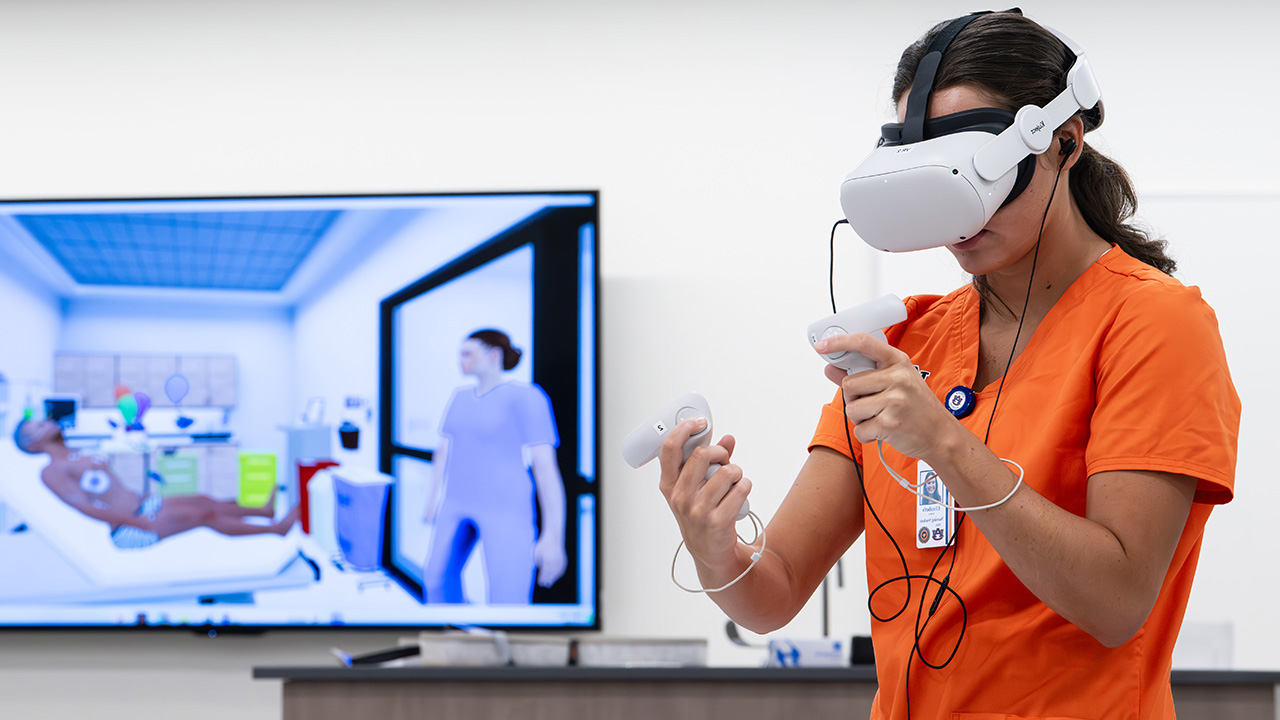content body
It’s no secret that few things have changed the world more than artificial intelligence (AI) in recent years. At Auburn University, faculty members are embracing this technological advancement in a variety of ways that impact virtually every corner of campus.
Whether it is professors using AI in the classroom to modernize curriculum or researchers harnessing its powers to revitalize and revolutionize work in the laboratory, Auburn’s educators and scientists have not only embraced the new and powerful wave, but have emerged as industry leaders in academia in the process.
The newly launched AI in Teaching and Learning Showcase, a warehouse of campus projects that illustrates faculty’s willingness to innovate their world, serves as a top-notch hub of all things AI. Administered by the Biggio Center for the Enhancement of Teaching and Learning, the showcase highlights educators who have successfully integrated AI into their teaching.
Faculty members — from aerospace engineering, pharmacy and mathematics, to journalism, music and apparel design — have integrated AI into teaching frameworks, student engagement and learning outcomes, assignments and projects and learning strategies.

AI in action
In the Harrison College of Pharmacy, Erika Kleppinger is using generative AI to simulate client interactions for students looking to hone their skills working with patients, while Elizabeth Covington is asking students to use ChatGPT to brainstorm questions and obtain necessary patient information to critically evaluate AI-generated treatment plans.
“This is an excellent tool for students to practice asking questions of a patient and to try out different strategies for an interview approach,” Kleppinger said in her showcase submission.
The Department of Aerospace Engineering’s Russell Mailen has implemented AI in a design project for the outer mold line of aerospace vehicles. His students develop systems using hypothetical prompts, then interact with AI to develop key performance parameters, features and characteristics of the system before using AI to render a graphical image of the design.
Georges Fares of the Department of Consumer and Design Sciences has created an AI-based assignment for his interior design students. Using AI image-generating tools, students develop and iterate designs that promote relaxation, mindfulness and introspection while exploring the psychological and emotional impacts of their spaces.
“This project prepares students for the future of design by fostering innovation, holistic thinking and ethical considerations, contributing significantly to the field of interior design education,” Fares said in his showcase description.
Propelling progress
Faculty have had consistent support from university administration to continually implement AI into their lessons and work. Under the oversight of the Biggio Center, educators can receive instruction and guidance about successful and seamless implementation methods and pedagogical strategies to maximize the impact of their chosen AI tools and innovations.
Asim Ali, the Biggio Center’s executive director, has been at the forefront of campus’ AI awakening. He has served as a leader in the university’s augmented and virtual reality initiative — the AUX: Auburn Immersive Experiences internal grant program — as well as with his AI work for the Office of the Provost. A frequent speaker on the benefits and limits of AI, Ali has led the Biggio Center in playing an instrumental role in positioning Auburn as an industry leader in AI within the Southeastern Conference and nationally.

He encourages faculty to critically explore AI and integrate it thoughtfully into their teaching to better support students in navigating the responsible use of emerging technologies.
“I use generative AI in the class I teach for the Harbert College of Business to help students simulate real-world business scenarios and contemplate uses of AI,” said Ali, who holds a master’s in information systems management and a doctorate in adult education from Auburn. “The AI Showcase highlights that, across disciplines, our faculty are leaning into innovation and preparing students for the world ahead.”
On the research side, AI@AU — an initiative led by the Department of Computer Science and Software Engineering in the Samuel Ginn College of Engineering — is designed to expand AI research and education across campus and has several programs, projects and initiatives fueling thought-sharing and growth. The use of AI in research has led to numerous academic publications of high-quality papers as well as several news items that illustrate the far-reaching impact of AI-led research.
Recently Engineering established a new research facility — the Auburn University Center for Artificial Intelligence and Cybersecurity Engineering — to uncover pioneering advancements in AI-driven cybersecurity solutions.
Virtual reality is for real
Virtual reality (VR) has emerged as a versatile and effective application for AI, and Auburn educators are mobilizing it in several ways. From College of Nursing faculty like Tiffani Chidume, who uses VR to simulate real-world situations for students, to the Culinary Science program’s Mark Traynor developing a fully immersive VR environment to supplement theoretical learning in food safety and sanitation, faculty are integrating VR into their educational approaches.
Rachel Prado from the Department of Chemistry and Biochemistry is using VR to help students visualize organic molecules and reactions and revolutionize the teaching of organic chemistry mechanisms through virtual experiences.
Michael Howard from the Department of Chemical Engineering recently won a National Science Foundation CAREER Award for his work in developing new products that may help streamline production of the drying-induced assembly of colloidal-particle coatings, such as paint. His VR work was noted by reviewers as an example of his impact as an educator and scholar.
Chidume, Prado and Howard are just a few examples of faculty who have embraced the new tech as assets in class. All three have been buoyed by AUX grants from the Biggio Center and the Office of Information Technology for their efforts to create innovative learning experiences with augmented or virtual reality.
The aforementioned faculty are just a few of the dozens across campus who are embracing the powerful AI wave that is expected to grow and gain momentum for years to come. Many more will be featured in subsequent articles in an ongoing AI Across Campus series.






